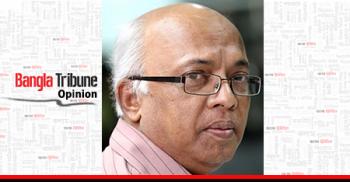 Mahathir Mohamad's assessment some years ago of General Suharto sometime after the deposed Indonesian dictator died does not hold up to scrutiny. The former Malaysian prime minister, while paying tribute to the deceased dictator, proffered the information that all that reports of General Suharto having had any prior knowledge of the 1965 coup in Indonesia were nonsense.
Mahathir Mohamad's assessment some years ago of General Suharto sometime after the deposed Indonesian dictator died does not hold up to scrutiny. The former Malaysian prime minister, while paying tribute to the deceased dictator, proffered the information that all that reports of General Suharto having had any prior knowledge of the 1965 coup in Indonesia were nonsense.
Now place Mahathir's comment beside that of Tan Sri Ghazalie Shafie, once Malaysia's deputy prime minister. In May 1994, addressing a group of South Asian media personalities in Kathmandu as a special guest, Shafie left everyone surprised by his revelation that towards the end of 1964 the Malaysian government, then led by Tunku Abdul Rahman, had made contact with an Indonesian military officer named Suharto about the prospects for a change of regime in Jakarta. He did not elaborate, probably out of a realisation that he had already said more than he needed to.
And then there is the strange case of Colonel Latief, one of the officers involved in the terrible happenings on the night of 30 September 1965. Soon after Suharto was forced from power in 1998, a long-imprisoned Latief expected the new president, B.J. Habibie, to set him free.
Habibie had already released from long confinement a good number of former sympathisers and supporters of the banned Partai Komunis Indonesia (PKI) and military officers General Suharto had put away once he gained power after the chaos that had been given out as an attempt by the communists to seize control in Jakarta. As Latief would recall, he was with General Suharto on 30 September.
Plans had already been put in place by Suharto, with Latief and other officers, to kidnap seven generals allegedly plotting a coup against President Achmad Sukarno, produce them before the President and thereby force them to reveal details of the ‘conspiracy’.
Suharto and Latief were, from such a perspective, pro-Sukarno officers, or at least Suharto tried giving that impression. In the event, forces loyal to Suharto kidnapped the seven generals, and six of them were murdered soon after their abduction by Suharto loyalists. Latief, with a number of other officers, was quickly placed in imprisonment. General Suharto then let the world in on the news that the PKI, which at that point had a membership of 20,000,000 Indonesians, had conspired to kill the generals. It was a lie. It remains a lie.
In point of fact, the PKI, though it enjoyed close links with President Sukarno and his government and certainly harboured ambitions of taking power someday, was not at all involved with the tragic events of 30 September 1965. Like all Indonesians, it was taken by surprise when Suharto and his cohorts seized the state and was positively horrified when the Indonesian army, armed with a list of 5,000 suspected communists provided by the United States embassy in Jakarta, went after its members and supporters.
In the weeks and months that followed September 1965, Suharto and his soldiers let loose a bloodbath, killing as many as two million Indonesians and placing 700,000 more in prison without trial. A systematic campaign was undertaken to wipe out the PKI, strip President Sukarno of his authority, and establish friendly links with the West.
In the process, D.N. Aidit, the widely respected leader of the PKI, was kidnapped and murdered. No trace of him or his remains was to be found.
Dr. Subandrio, as Foreign Minister, the country's respected international face, was arrested, tried for his ‘role’ in the murder of the six generals and sentenced to death in October 1966. The sentence was later commuted to life imprisonment. Subandrio was to spend twenty-nine years in jail. When he emerged free (he died in 2004), he still refused to reveal his side of the story and appeared intent on not upsetting Suharto. It was similar, lingering fear that prevented thousands of Indonesians finally able to make their way out of prison from speaking of their experiences in the post-September 1965 period.
With Suharto now long dead (he died at the ripe old age of eighty-six), it remains a travesty of justice that the Indonesian judicial system was never able to bring him to trial and punish him for all the crimes committed by his brutal regime. And with brutality came venality.
In thirty-two years in power, a period which saw him engineer his re-election by parliament over and over as a matter of routine, Suharto gave free rein to his children and his cronies as they swiftly and brazenly established their hold on the economy. All Indonesians knew of the corruption that Suharto's children indulged in.
None of them knew of the means by which the tide could be turned, for the Golkar democracy (and it was fake democracy which ensured that the army and its civilian loyalists, through a political party they called Golkar, would always guarantee Suharto's hold on power) the dictator had put in place was a system that rendered the regime immune to prosecution of any kind. Besides, there was the added measure of Suharto's friends in the West finding in him a strong base for an upholding of their political and economic interests in the country.
The opportunities that opened up for Suharto-run Indonesia in September 1965 had been translated into privileges the West was not going to fritter away through asking Suharto to democratise his regime.
One only has to read what the John Pilger reveals in his seminal work, The New Rulers of the World. Months after the military seized power under Suharto, notes the Australian journalist, representatives of Western multinationals, with men from the new Indonesian dispensation in ingratiating attendance, gathered in Europe to stake their claims to Indonesia's natural resources. Of course, it was all couched in soothing language. These firms were all ready to assist Jakarta in harnessing its resources in the ‘interest’ of its people.
Today, as one surveys the scene from this long distance in time, one realises only too well whose interests the 1965 coup served. Western firms greedily went into Indonesia to have Indonesian workers make products for buyers in Europe and America. A worker who produced a pair of Nike trainers in a Jakarta factory was paid scandalous wages that equalled no more than the price of the strings used on a single pair of trainers. But the firms in the West were happy and, in Jakarta, Suharto's family was ecstatic with all the money it was funnelling into its coffers through pilfering nearly everything it set its sights on.
This, then, is the legacy that General Suharto has left behind. And more. It was his regime that left the people of East Timor, today Timor Leste, traumatised for twenty-four years following the Indonesian army's conquest and colonisation of the island once the old Portuguese colonial power departed in 1975. The Timorese independence leader Xanana Gusmao was arrested and taken away to Jakarta as soldiers went about disbanding his Fretelin party.
Of the 650,000 Timorese who inhabited the island in December 1975 (for that is when the Indonesian military invaded), 250,000 would lose their lives in their long struggle for freedom and at the hands of Suharto's forces. US President Gerald Ford and Secretary of State Henry Kissinger, meeting Suharto on the eve of the Timor invasion, quickly led the general to believe that Washington would look away as his army went into occupying the island.
In 1966, as the bloodbath inaugurated by General Suharto went on, the philosopher Bertrand Russell served a severe indictment on what the regime was engaged in. "In four months," said he, "five times as many people died in Indonesia as in Vietnam in twelve years."
Few have shed tears for Suharto. Those who did, and do, must be counted among those in whom the principle of the dignity of the individual went grossly missing. Nothing can be more demeaning for the world we inhabit than the sight of men who scale the peaks soaked in the blood of others, stay on top in defiance of all decency, and then pass into death without morality and the wheels of justice having had them pay for their misdeeds.
Syed Badrul Ahsan is the editor-in-charge at The Asian Age


